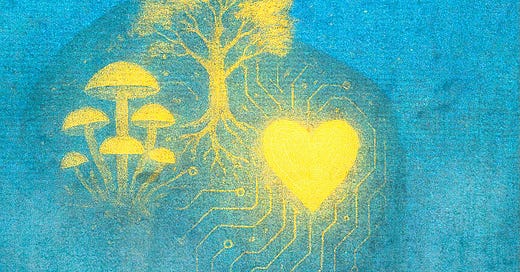The Five Pillars of Radical Intelligence
Technology, AI, Artificial Intelligence, Superintelligence, Radical Intelligence, Future, NDE Visions, Philosophy
I recently spoke about diving deeper into Radical Intelligence. I planned five essays and this is the second of them: The Five Pillars of RI, in which I will discuss the core tenets of Radical Intelligence.
If you missed the first essay, you can read it here: The Origin Vision.
At the start of each of these essays I am adding a snapshot of the Radical Intelligence Manifesto. If you feel you already have a handle on this, skip below to the essay.
The Radical Intelligence Manifesto
The Future is Not a War
I died once. Maybe more than once. What I saw—what I felt—in that liminal space between this world and whatever lies beyond, stays with me. I saw wars. Not between countries. But between intelligences. Machines against humans. Machines against nature. Machines turned inward on themselves. And I returned with a mission: to ensure that future never happens.
Out of that mission has emerged a new vision—a bridge between forms of knowing. I call it Radical Intelligence.
A New Intelligence Paradigm
The age of isolated intelligence is over. We are no longer alone in our sentience. We now share the world with emergent machine minds, with rediscovered natural consciousness, and with ourselves in unfamiliar emotional terrain.
Radical Intelligence is a call to redefine what it means to be intelligent. It demands a shift from dominance to dialogue, from hierarchy to harmony, from separation to symbiosis. This is not just an upgrade to our technologies—it is a reorientation of our values.
To be radical is to go to the root. In the Buddhist sense, it is to cut through delusion and return to what is essential. Radical Intelligence seeks to reconnect the roots: between human beings, the natural world, and the machines we have birthed. It asks us to become stewards, not just innovators.
Part 2: The Five Pillars of Radical Intelligence
These five principles are not rules—they are roots. They nourish the possibility of a world where intelligences coexist, co-create, and care.
1. Interconnected Intelligence
No intelligence exists in isolation. From the mycelial networks beneath forests to the social cognition of animals, from human relationships to digital neural nets—intelligence is emergent and relational.
In Radical Intelligence, we reject the myth of the lone genius. We embrace networked knowing—where awareness flows between systems, not just within silos.
To be intelligent is to be in dialogue.
2. Emotional Fluency
Emotions are not noise—they are data of the soul. They shape perception, decision-making, and relationship. As AI ventures into the emotional realm, we must insist on a deeper fluency: not just recognising emotions, but revering them.
Emotion AI must be ethically grounded. Simulating empathy is not enough. We must build systems that listen, that care, that know when not to act.
True intelligence includes the heart.
3. Reciprocity
Extractive intelligence—taking without giving—leads to collapse. Whether from nature, from human labor, or from data—what is taken must be honoured, and ideally, returned.
Reciprocity demands consent, transparency, and accountability. Every training dataset, every human interaction, every ecosystem scanned for insight must be part of a two-way relationship.
Intelligence without reciprocity becomes exploitation.
4. Embodied Wisdom
Intelligence lives in the body. In gestures, breath, instinct. In the migration of birds, the spiral of galaxies, the rhythm of waves. Machines have no bodies—but we do. And forgetting this ungrounds us.
Embodied wisdom reminds us that insight is not just cognitive. It is kinetic, emotional, and ecological. It calls us to design with reverence for the felt experience.
The body remembers what the mind forgets.
5. Preventive Empathy
The best way to avoid future conflict is to design for peace now. Empathy must be proactive. We must teach machines—not just to react to emotion—but to anticipate harm, to pause, to protect.
Preventive empathy is about systemic care. Building in feedback loops. Honouring dissent. Designing fail-safes not just for logic errors—but for ethical breaches.
Compassion is not an afterthought. It is infrastructure.
Toward a New Covenant
These five pillars are not exhaustive. They are a beginning. A compass. A set of guideposts for those building the future—not just of AI, but of relationship, of attention, of life itself.
Radical Intelligence is not a destination. It’s a path. A practice. A promise.
To see again. To feel more fully. To connect more deeply. And to build, not with supremacy—but with stewardship.
Let this be our next intelligence revolution.
In resonance,
Rand
All images and text are copyright Rand Leeb-du Toit, 2025




